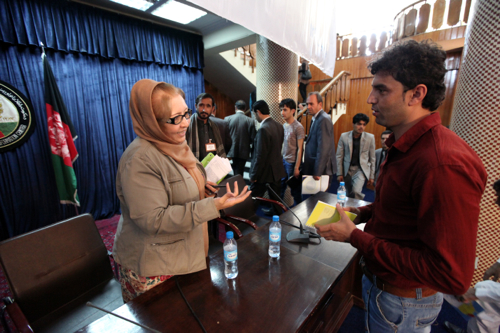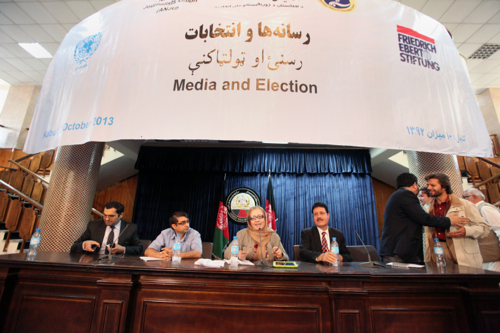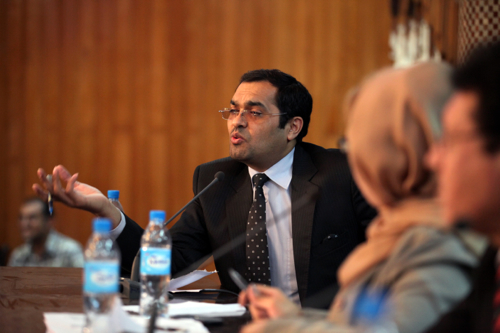KABUL - Over 200 Afghan journalists, who gathered in the capital, Kabul, this week for the first-ever national congress of one of the country’s leading journalists’ association, vowed to cover next year’s Presidential and Provincial Council elections, slated for 5 April, responsibly and to encourage women’s participation through their “accurate and impartial” reporting.
Speaking at the end of the gathering of the Afghanistan National Journalists’ Union (ANJU), the body’s Executive Director, Faheem Dashty, said that if media organizations and journalists perform their duties with “full honesty and professionalism,” they can have a positive impact on the transparent and fair conduct of elections – which United Nations officials have previously described as critical to the country’s future stability and continued international support.
“Despite the fact that independent media organizations are very few in Afghanistan and a majority of them have certain affiliations and follow specific policies, journalists can still effectively perform their duties through reporting which deals with the realities of the situation the country currently finds itself in,” said Mr. Dashty.
Facilitated by the UN Assistance Mission in Afghanistan (UNAMA) and Friedrich Ebert Stiftung, a German foundation, the three-day gathering of members of ANJU reviewed the body’s constitution, elected a 34-member High Council, which acts as a management board for the union, and held panel discussions on the role of journalists in elections and the need for a journalism code of ethics, in addition to providing the opportunity to share experiences and knowledge in person.
Speaking at one of today’s panel discussions on the topic ‘media, elections and the role of journalists,’ the spokesperson for Afghanistan’s Independent Election Commission (IEC), Noor Mohammad Noor, said that ensuring security and sufficient participation of women in the electoral process are the two main challenges facing the electoral process.
“We have spoken with the security institutions and they have given full assurances for security of the majority of the voting stations during elections,” Mr. Noor added about next year’s elections, which will mark the transfer of power from one elected president to another elected president for the first time in Afghanistan’s history.
The IEC official noted that the number of female candidates for the Provincial Council polls is less than the number of seats allocated for women in the Provincial Councils of 11 Afghan provinces.
However, he said that the election body has spoken with the civil society, political organizations, tribal elders and the Ministry of Women’s Affairs in those provinces in order to encourage and support women to take part in the ongoing voters’ registration process and register themselves as candidates.
The IEC has noted that only the south-eastern Afghan province of Paktika does not have any female candidates.
Addressing the same panel discussion today, the head of Afghanistan’s largest election observers’ group stressed the media’s role was “highly critical” to conducting “transparent and justified” elections.
“In addition, there is need for impartiality from the government, the presence of national and international observers and a debate amongst the prominent election candidates regarding their programmes and policies via the media on a large scale,” said the head of the Free and Fair Election Foundation of Afghanistan, Jandad Spinghar.
Mr. Spinghar added that his organization will send some 10,000 observers to all of Afghanistan’s 34 provinces during next year’s elections.
Another speaker, Kawa Ahangar from the International Foundation for Electoral Systems, said that that body’s assessment of the electoral landscape suggested that some institutions and individuals reject the upcoming elections and are using religion as a tool to prevent people from participating in the electoral process.
However, he said that media can play a significant role in raising people’s awareness and preventing any external interference in the election process through “effective and efficient reporting.”
Related article:
- At UN-backed event in Kabul, Afghan journalists discuss progress and challenges faced by media






